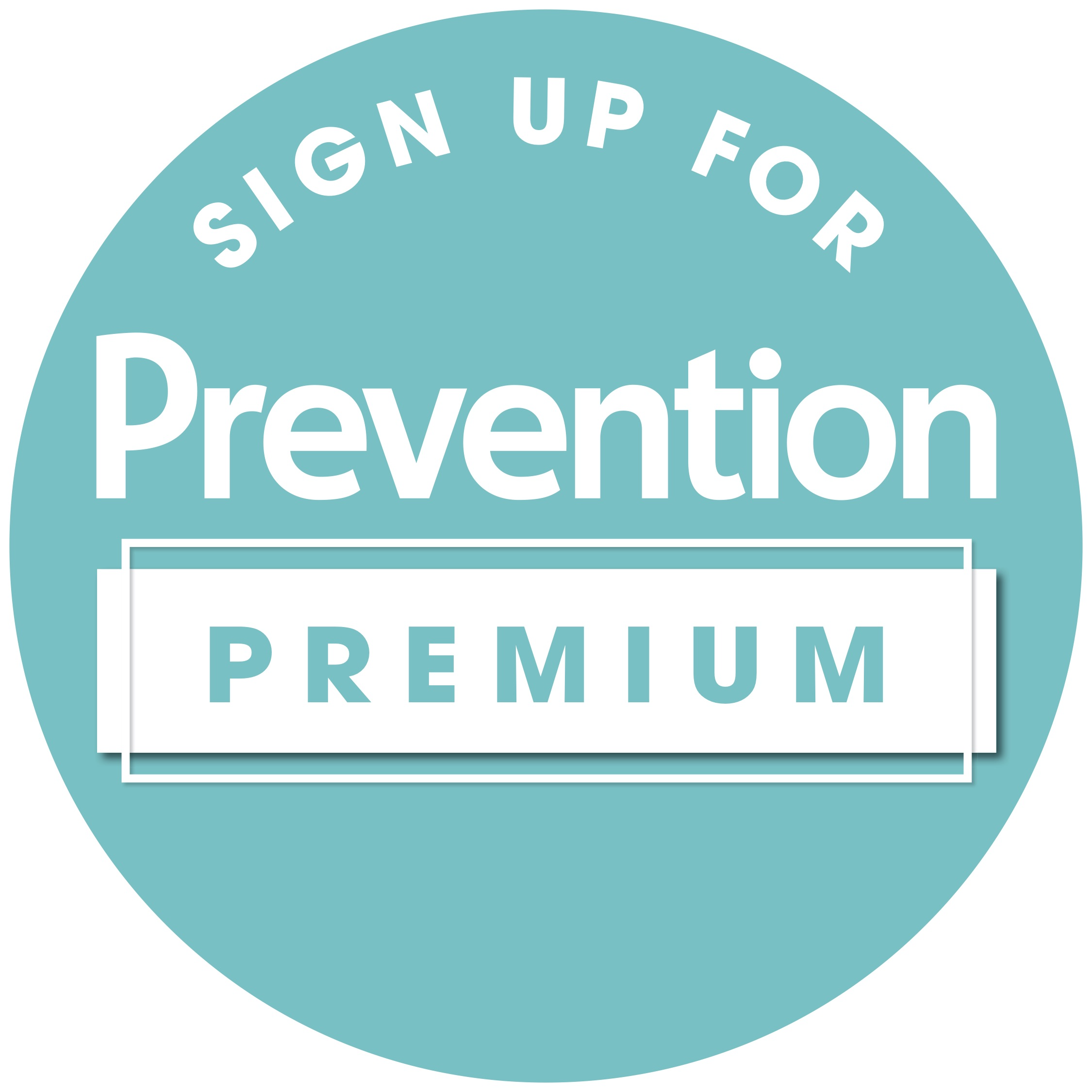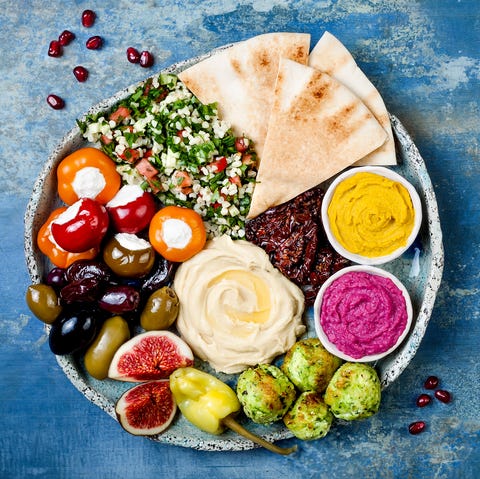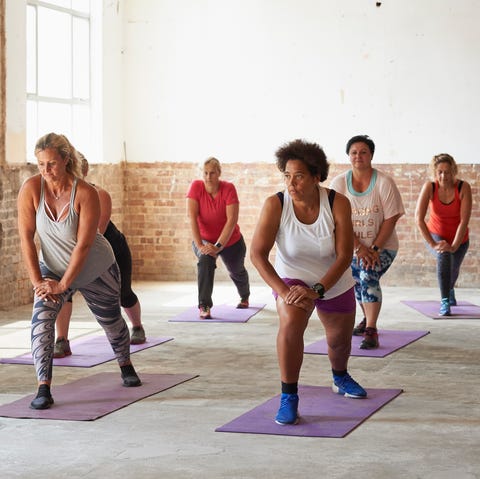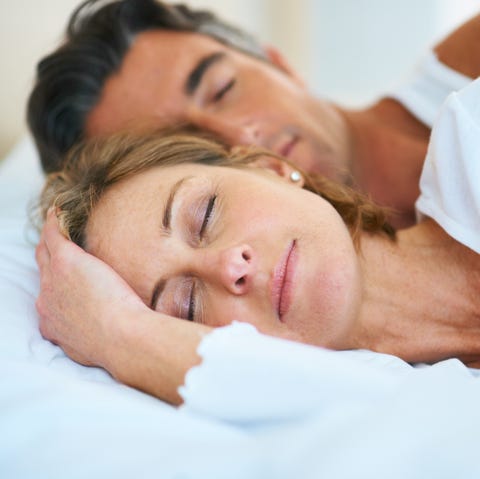Easy Way to Loose Weight at 50
There's no reason you can't look as fit and fabulous at 50 as you did at 40—Kelly Ripa, Taraji P. Henson, and Jennifer Lopez, who are all in their 50s, are living proof. But losing weight after 50 isn't an easy process. Even stars with personal trainers and nutrition coaches have to work a little harder to lose the pounds once they hit this milestone age.
One of the main reasons you'll have to put in extra effort: Your body composition changes as you age. You lose muscle mass at an average rate of 3 to 5% for every 10 years after age 35, and this can impact the way you burn fat. "Your body goes into its aging stage as it leaves the growing one," says Luiza Petre, M.D., a New York City-based weight loss and management specialist and assistant clinical professor of cardiology at the Mount Sinai School of Medicine. "When this happens, your body doesn't need as much energy as it used to," she explains.
But there's more to losing weight after 50 than that. And yes, it's 100% possible to drop pounds after you hit the mid-century mark. Here's what you need to know—and how to make it happen.
More From Prevention

Why is losing weight after 50 hard?
The decline in lean muscle mass is definitely a factor, says Keri Gans, R.D., author of The Small Change Diet . "The older you get, the more muscle you may lose and muscle burns more calories than fat does," she says. "That is why as we get older it is very important to stay active, strength and resistant train, and consume protein with all meals."
Of course, your body may be showing the signs of wear and tear a little more than it did in the past. All those years of playing sports, running after your kids, and walking up and down stairs can take their toll. You may notice that your joints are a little stiffer and your muscles are a little sorer than they were a few decades ago. Then, there's the issue of your ever-evolving metabolism.
According to the American Council on Exercise, your resting metabolic rate, a.k.a. your body's ability to burn calories while sitting on the sofa doing nothing, decreases by about 1 to 2% per decade due to muscle mass loss and increased fat mass. Our diets usually don't change enough to account for this metabolic adjustment, meaning weight can creep up slowly but surely with every birthday.
"There are a number of roadblocks people in their 50s will face when trying to lose weight," says Brian Durbin, a NSCA-certified strength and conditioning specialist and personal trainer. "But once you know what they are—and how to work around them—it's easy to be successful at dropping pounds."
One of the best things you can do at any age is shake up your routine and try something new. Follow these tips—courtesy of some of the world's best weight-loss experts, dietitians, and personal trainers—to help you drop the pounds, and keep them off for good.
1. Talk to your doctor about a weight-loss plan.
First stop after you celebrate the big 5-0 should be your doctor's office. She can assess your current state of health, address any health problems that may be affecting your weight (like pre-diabetes or sleep apnea), and help you come up a plan for diet and exercise, says Dr. Petre. She may even be able to recommend a physical therapist or personal trainer for you.
While you're in the office, ask her to look at all the prescription meds that you take. "There are myriad commonly used medications that promote weight gain, including diabetes medication, antidepressants, and high blood pressure medications," says M. Daniela Hurtado, M.D., Ph.D., a consultant in endocrinology, metabolism and nutrition at Mayo Clinic. "Many primary care providers forget about this! But there are medications for these common disorders that can be weight-neutral and even promote weight loss."
2. Accurately calculate how many calories you actually need.
Your metabolism changes with time and, if you've had to modify your exercise routine as well, the amount of calories you need can be drastically different now than it was a few decades ago.
A good place to start is The National Institutes of Health's Body Weight Planner. This handy tool lets you enter in your height, age, current weight, physical activity level, and goal weight and gives you a calculation of how many calories you'll need to eat on a regular basis to hit your goal in a set period of time. You can choose the time frame you're after to be a little more aggressive with your weight loss or less aggressive.
3. Focus on nutrient-dense foods.
In case you're not familiar with them, nutrient dense foods are "foods that are packed with vitamins and minerals but not too many calories," Gans says. Think: fruits and veggies, 100% whole grains, nuts and seeds, seafood, low-fat dairy, and eggs.
"It is also very important to include adequate protein," Gans says. "Protein helps to build and repair muscle." Filling your plate with these quality ingredients will help you feel fuller, longer—and help you shed pounds.
4. Try to limit certain foods.
Sure, you should enjoy yourself, but there are some foods that aren't doing you any favors—regardless of how old you are.
"As with any age you should limit your added sugars, sodium, and saturated fat," Gans says. That doesn't mean you can't have these foods ever and hit your weight loss goals, it's just a good idea to have less of them. "Foods such as baked goods, candy, overly-processed meats, deep-fried foods should be only enjoyed on occasion," Gans says.
5. Give alcohol the side-eye.
Cocktails, wine, and spirits can add extra calories to your day without filling you up. "No matter the age, if you are looking to lose weight you be mindful of the calories in your cocktail or wine glass—they do have a way of sneaking up on you," Gans says.
If cutting out booze entirely just isn't going to happen, Gans suggests putting a cap on how much you have on a regular basis. "Try and keep to no more than one serving of an alcoholic beverage per day without any added sugars and watch those portions," she says. Just a reminder: A serving is 12 ounces of beer, 5 ounces of wine and 1.5 ounces of a distilled spirit.
6. Get your hormones checked.
This is where things get complicated because most times the culprit isn't hormones, says Dr. Hurtado. However, she notes, if your physical exam shows signs of hormone abnormalities, it's a good idea to get your hormone levels checked. That's because as we age, progesterone, testosterone, and other hormones decline, which may set the body up for storing fat instead of losing weight, says Jennifer Burns, N.M.D., a naturopathic physician in Phoenix. If they're out of whack, taking the steps to get your thyroid, adrenal glands, and other hormone levels back into balance can go a long way toward helping people in their 50s lose weight, says Burns.
Tami Meraglia, M.D., author of The Hormone Secret: Discover Effortless Weight Loss and Renewed Energy in Just 30 Days, agrees, adding that she believes the hormone to focus on is testosterone—especially for women over 50 who are trying to get fit. "There is ample discussion in the medical community about the effects of estrogen loss, but few people are aware of the importance of sufficient testosterone levels, which can help a woman slim down," says Dr. Meraglia. In fact, research shows that balanced testosterone levels reduce blood glucose levels, which may help promote weight loss and shrink belly fat.
7. Set realistic goals.
Declaring that you're going to lose 20 pounds before your beach vacation next month is unrealistic, not to mention unhealthy. "Be honest with yourself. How do you feel? How healthy are you? Making life changes takes courage and mental fortitude," says Dr. Petre. Break up big goals into smaller, more achievable ones. Focusing on how you're feeling and the positive changes you're making to your lifestyle, instead of the number on the scale, will help you stay motivated to reach your goals. "Triumphs make your courage grow," she adds. "Small achievements amount to large goals achieved."
8. Consult a dietitian.
There are dozens of different eating plans buzzing around the internet, each claiming to help you shed the pounds without feeling deprived (some of best diets for weight loss in 2020 are the Mediterranean Diet, the DASH Diet, and WW Freestyle). If you're not sure which one works best for your lifestyle, talk to a registered dietitian, who can break down the pros and cons and help you choose one that fits your nutritional needs and goals. An R.D. will also give you ideas on how to resolve road blocks that may get in the way of your goals, like emotional/stress eating, food sensitivities, nutritional deficiencies, and meal-prep fatigue. "Calorie restriction is the most important aspect of any weight-loss program, but the amount of calories should be individualized," says Dr. Hurtado. "This individualization is accomplished by considering multiple parameters such as sex, height, weight, age, and level of activity. Accountability is also important so tracking calories is a great tool that has been shown to help with weight loss and weight maintenance in research studies." These days, smartphone apps make calorie-tracking much easier than it used to be.
9. Follow a structured plan.
At 50, you've been around the block enough times to know that fad diets don't work. "No crazy fasts, cleanses, cutting out fats, or complex carbohydrates or proteins," says Jillian Michaels, health and wellness expert and author of The 6 Keys: Unlock Your Genetic Potential for Ageless Strength, Health and Beauty . Instead, consider following a medically supervised, clinically proven plan. According to Dr. Petre, these types of programs have a weight-loss success rate of more than 75%, especially if they involve personal support and weekly check-ins.
10. Ease into exercise.
Physical activity is important, but it must be started slowly, advises Dr. Hurtado. The general research-backed recommendation is for more than 150 minutes of moderate physical activity every week, but that number can be daunting if you're not in the habit of exercising. Jumping into a new and intense routine can also put you at risk for injuries. "I recommend to my patients starting with 10 minutes, three times a week if they are not used to exercise," says Dr. Hurtado. "From this baseline, they need to build up on time and intensity at their own pace."
11. Embrace strength training.
Even if you've never picked up a dumbbell in your life, now is the perfect time to learn to love them (but seriously, if you're a newbie, work with a trainer first so you don't hurt yourself!). That's because the secret to losing weight over 50 is building more muscle mass to increase your metabolism (you've got about 20% less now than you did when you were 20). "The good news is you can turn all of this around with a well-structured weight-training routine," says Durbin. "That can help you regain the ability to lose weight like you were able to 20 years ago." Aim to do strength training at least twice a week, whether you use free weights or machines or do bodyweight exercises. It doesn't hurt to lift every day—just make sure to work different muscle groups or train differently each day.
This content is imported from poll. You may be able to find the same content in another format, or you may be able to find more information, at their web site.
12. Choose activities that are easy on the joints.
Janna Lowell, a Los Angeles–based personal trainer, says she gets the best results among her 50-something clients when she has them do some cross training in the pool. Tired joints can keep you from getting a great workout, she says, and aches and pains can turn some people off exercise completely. "Water exercise is easy on the joints and can boost range of motion as well," says Lowell. "Even better, caloric expenditure is about 30% greater in the water than on land due to the resistance water creates." No pool? No problem. Walking is another great, low-impact cardiovascular exercise, as are cycling, kayaking, yoga, and dancing.
13. Make the most out of every workout.
If you're going to put in the effort to block out the time, squeeze into your sports bra, and get to the gym, don't let your exhaustion or aching joints hold you back from going all out! Alex Allred, a former national and professional athlete turned personal trainer, says this is one of her biggest pet peeves among 50-year-olds. "Far too many people think that just because they showed up, they're working out," says Allred. "But really, you need to be focused on what you're doing and pushing yourself hard enough to break a sweat or at least complete the full range of motion of a certain exercise." Not sure if you're doing a move properly? Ask! "I wish more people would flag down a trainer and ask, 'Am I doing this correctly?'" says Allred. It can make the difference between wasting your time or injuring yourself and reaching your weight loss goals through exercise.
14. See a physical therapist.
If an aching back, wonky knee, or creaky hip has kept you from working out on a regular basis, make an appointment with a physical therapist, suggests Samira Shuruk, an ACE-certified personal trainer. "After 50, many people have sustained injuries and don't know what their activity options are," she says. "Getting advice from a professional can truly help." Physical therapy can also help you rehabilitate an old injury or ease joint and muscle pain, setting you up for pain-free workouts.
15. Overhaul your diet.
Just like pop music isn't the same as it was when you were in your 30s, your metabolism has changed, too, which means you're burning about 250 fewer calories each day. So if you continue to eat like you did in the early 2000s—and don't increase your exercise—you'll inevitably gain weight, says Katie Ferraro, R.D., a dietitian and assistant clinical professor of nutrition at the University of California–San Francisco School of Nursing. Eliminating the junk food in your diet and replacing it with loads of fruits, vegetables, whole grains, and lean proteins can make cutting calories painless, she says.
16. Change how and when you eat.
It's not just what you eat, but how you eat that matters in your 50s, claims Anthony Dissen, M.A., R.D.N., Vice President of Nutrition at WellStart Health. He suggests focusing on fullness, not portion control, when you are planning your meals. "If our stomachs aren't full, we don't feel full, and we'll stay hungry," he points out. "When it comes to healthy weight loss and management, we want to strike that important balance between eating until we feel full and satisfied while still decreasing our overall calorie intake."
17. Consider therapy.
"There are many behavioral factors that affect dietary choices—calorie consumption, level of activity, emotional eating, boredom eating, eating in front of a TV, eating too fast, and eating at restaurants, among others," says Dr. Hurtado. She says many people aren't aware of these behaviors and that recognizing and understanding that they are present and affecting your weight loss journey is an important first step. "By realizing these behaviors, you can work to modify them through cognitive behavioral therapy, which emphasizes the importance that lifestyle changes should be maintained for life," adds Dr. Hurtado.
18. Get your stress in check.
Between paying college tuition for your kids, juggling more and more responsibilities at work, and dealing with aging parents, your 50s can be a prime-time for stress, says Durbin. The result? Emotional eating and a schedule that seems too jam-packed for regular exercise sessions. The solution: Schedule your workouts like they are doctor's appointments, he says. Sticking to a consistent routine can not only help ease stress, it can also help you stay on track with your diet. After all, who wants to ruin the benefits of a tough sweat session by eating a donut?
19. Get your sleep.
One great thing about being 50—you are completely over the social pressure to stay out late. (Though hormonal changes from menopause can have you staring at the ceiling at 2 a.m.) Doing your best to get 7 to 8 hours of snooze time every night is key to helping you lose weight, says Michaels. Dr. Petre adds that the two hormones that regulate appetite—leptin and ghrelin—go into overdrive without regular shut-eye. "This can trigger excessive hunger and lead to poor food choices and weight gain at any age," she says. Find a list of proven of sleep strategies right here.
20. Be mindful—and meditate.
It's important to practice mindfulness, especially when you're eating. "The more we try to multi-task while we eat, the more likely we are to overeat and not feel as satisfied by the meal or snack we've just eaten," Dissen explains. "By simply taking a breath and treating our mealtime as special, it allows us to really taste our food and notice its flavors, textures, and tastes." Mindfulness can aid in stress relief, too. Michaels suggests dedicating five to 10 minutes a day to meditation.
21. Practice self-care.
Whether it's treating yourself to manicure or taking a mental health day from work, taking care of yourself shouldn't be looked at as a luxury. The smallest gestures can make a big difference in reducing stress, which can make a big impact on your weight loss. Plus, when you show yourself a little more love, you can use that energy to do things that support your goals, like eating healthy, exercising, and meditating. Not sure how to start a self-care routine? First ask yourself why you need more time to take care of yourself. Are you working too many late hours at the office? Do you feel burned out and wish you could be calmer? Once you figure out why you need to make some more time for yourself, it can help you decide what will be a good activity or routine for you.
22. Don't give up.
If you've made changes and are still struggling to lose weight, remember that it's not because you lack willpower. Balancing calorie intake and expenditure is complicated and some things like genetics can't be modified, notes Dr. Hurtado. "In addition to dietary modification, physical activity, and behavior modification, patients who are not successful losing weight should discuss other available tools with their doctors, such as weight loss medication, endoscopic procedures, and bariatric surgery," she says.
Leah Groth is a freelance writer based in Philadelphia. Her work has appeared in a number of international publications including Glamour, Prevention, Health, VeryWell, Business Insider, and Reader's Digest. In those rare moments that she isn't putting words together on her keyboard, you can find her chasing after her two children and hunting dogs, working on her 100-year-old colonial home, or trying out all of the cutting edge gadgets and products she is writing about. She also loves working out and drinking copious amounts of coffee.
Kaitlyn Pirie is a senior editor in the Hearst Health Newsroom, where she reports, writes and edits research-backed health content for Good Housekeeping, Prevention and Woman's Day. She has more than 10 years of experience talking to top medical professionals and poring over studies to figure out the science of how our bodies work. Beyond that, Kaitlyn turns what she learns into engaging and easy-to-read stories about medical conditions, nutrition, exercise, sleep and mental health. She also holds a B.S. in magazine journalism from Syracuse University.
Source: https://www.prevention.com/fitness/a20467060/lose-weight-after-50/




0 Response to "Easy Way to Loose Weight at 50"
Post a Comment